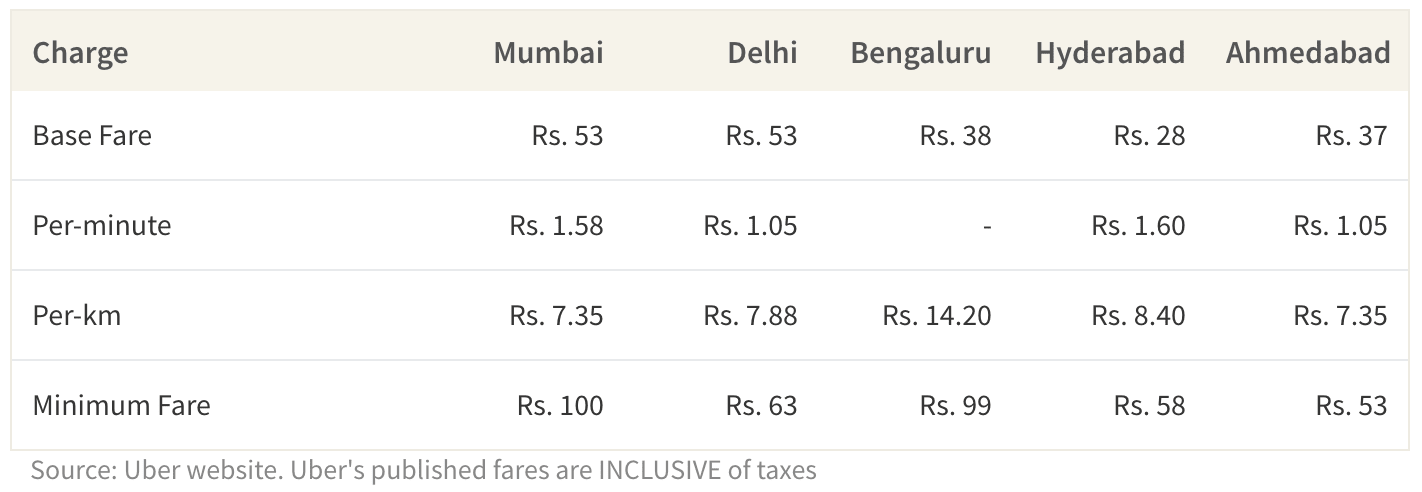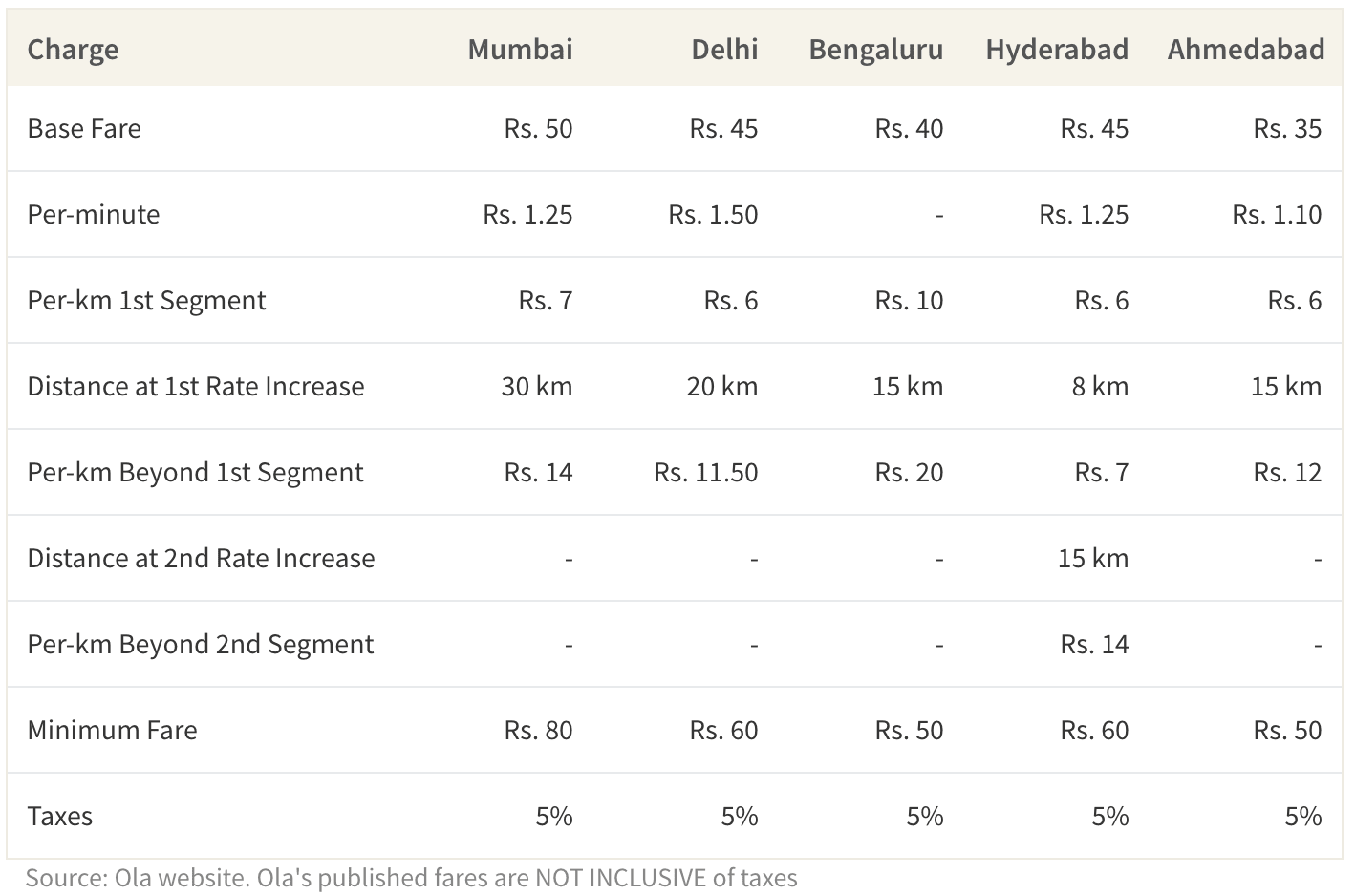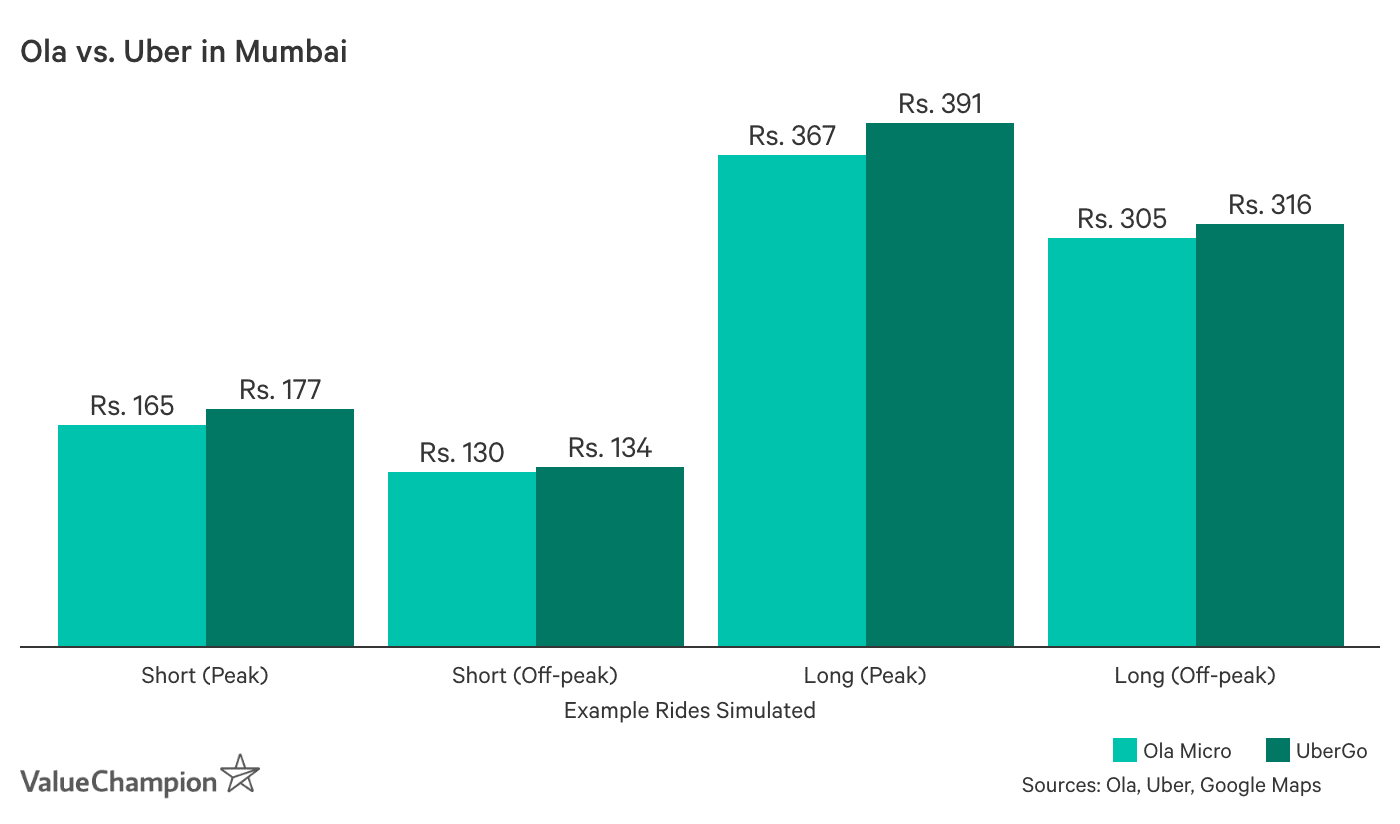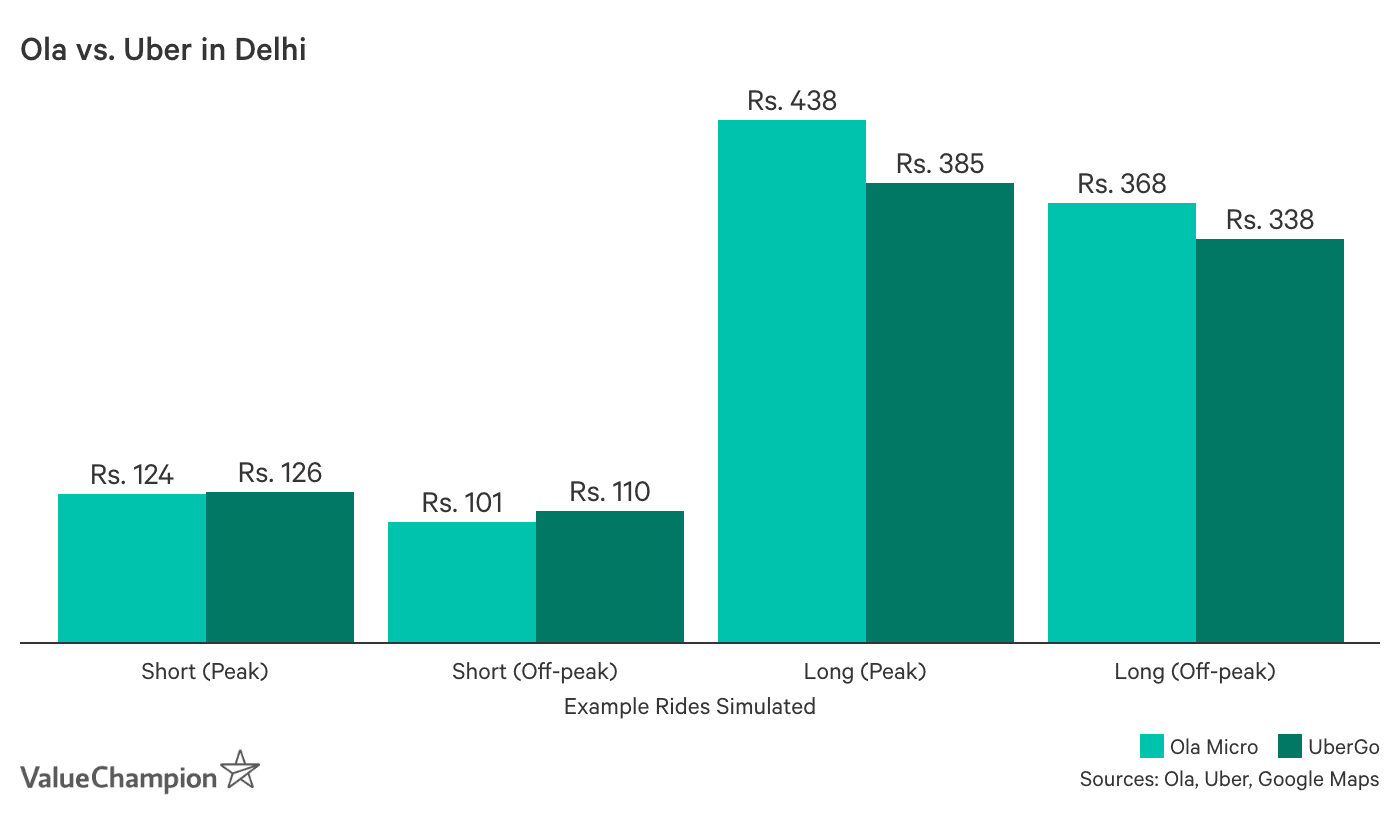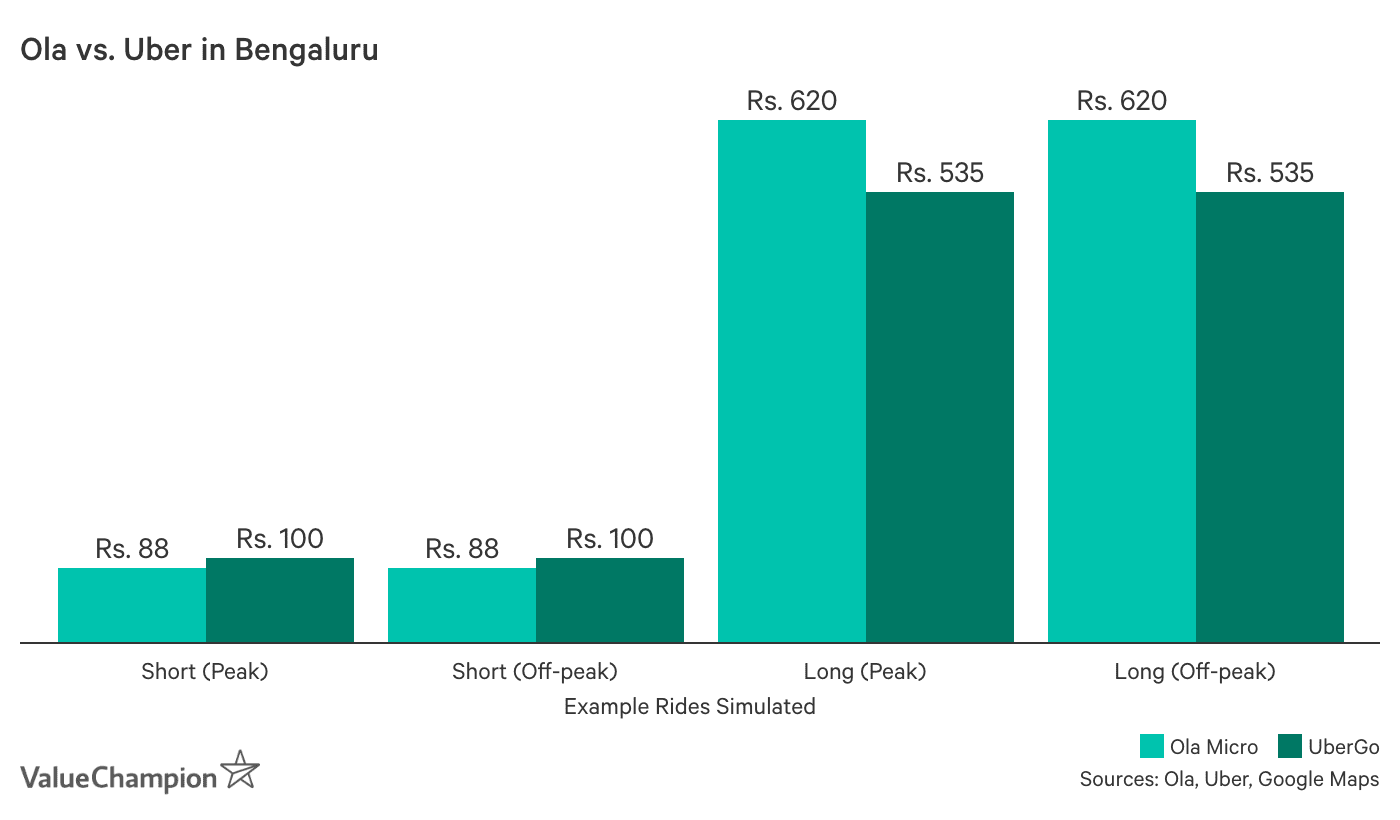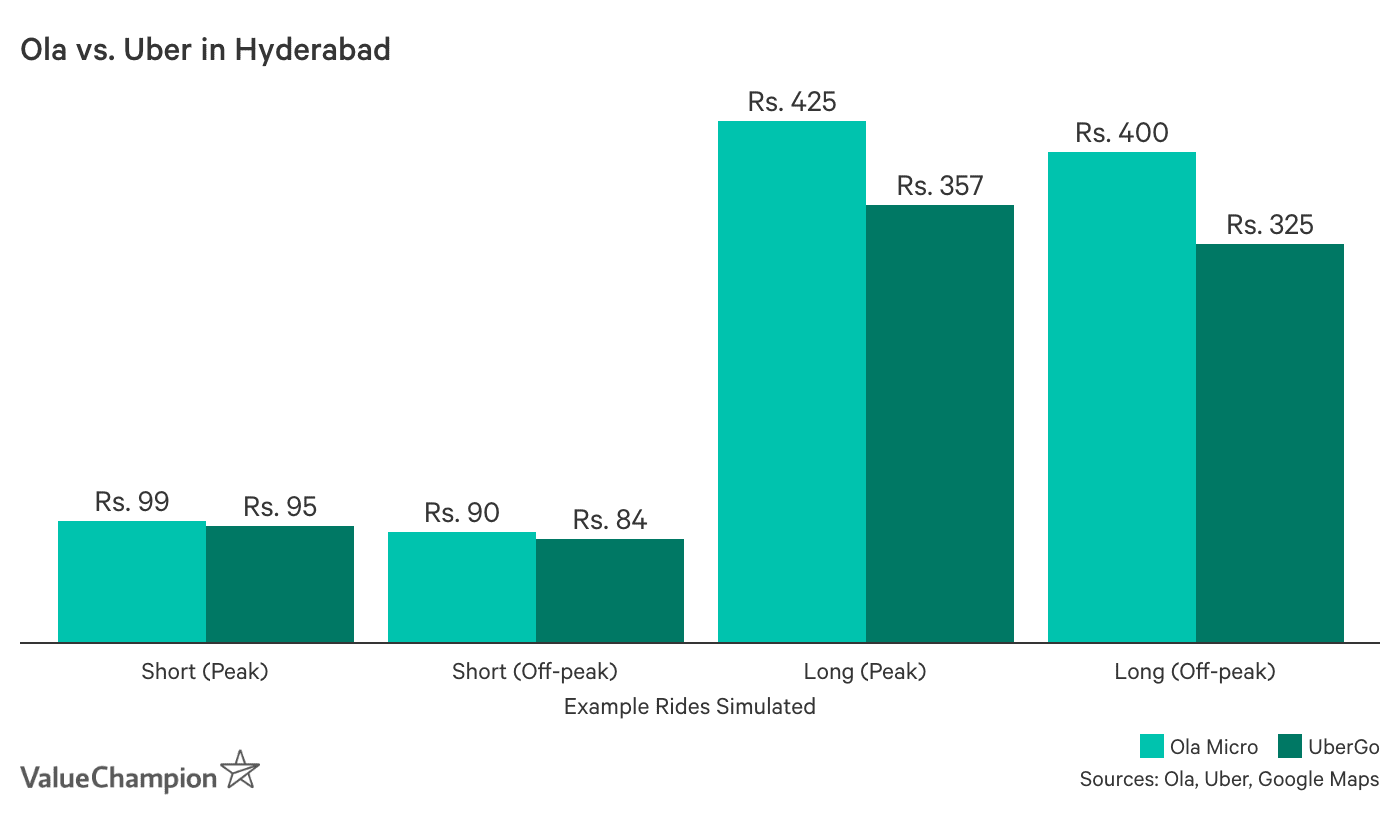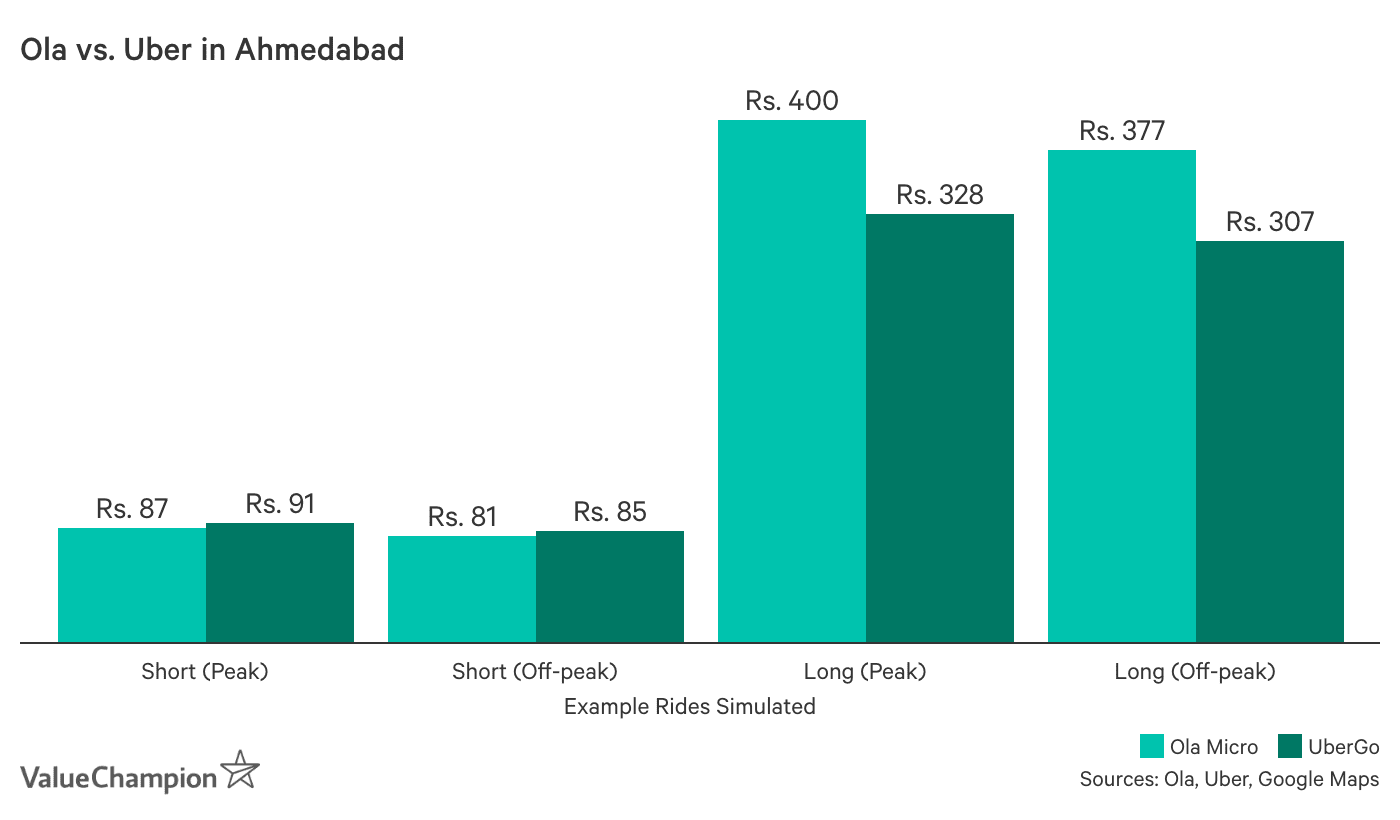Uber is fighting wars on many fronts, but hasn’t been winning very often. What is the situation in India?

If someone wants to order a ride share in India, either Ola or Uber is the likely choice. The two companies held a combined 96% of the market at the end of 2017 (according to Quartz), and both companies continue to independently grow their businesses in India as merger rumors have cooled down.
Frankly, there are multiple factors that could drive a consumer’s decision to choose one service over another, such as price, car type, reliability and safety, among others. Notably, pricing is the most important factorand can be most easily, objectively observed in aggregate.
To get a sense of which rideshare currently offers better pricing, we considered Ola Micro and UberGo as a baseline, and then we simulated short- and long-distance rides during peak and off-peak hours in the 5 biggest cities in India.
Most of the Time, Ola Micro Wins for Short Distances and UberGo Wins for Long Distances
In the cities we examined, we found it’s more often a safe bet to pick Ola Micro for short distances, but UberGo is more often the winner for long distances.
Uber and Ola have different pricing formulas for each city in India, but the main variables that determine a ride’s cost are 1) base fare charged at the start of a ride, 2) distance and 3) ride time.
UberGo Pricing Formula
In Ola’s pricing structure, the charge per kilometer can increase depending on ride distance.
Ola Micro Pricing Formula
We used Google Maps to plot one relatively short trip (e.g. Select CITYWALK Mall to Haus Khas Market in Delhi, 6 km) and long trip (e.g. UB City Mall to Kempegowda Airport in Bengaluru, 35 km) in each region.
Then, to examine the time variable, we took Google’s estimates for how long each trip would generally take during peak hours (heavy traffic) and off-peak hours (light or practically no traffic) to get a sense of both extremes.
Mumbai: Ola Micro is Generally Cheaper Across the Board
In Mumbai, Ola wins out for short and long rides during both peak and off-peak times. We simulated a short ride from Infiniti Mall to Chhatrapati Shivaji Maharaj Airport (7.5 km) and a long ride from Ram Mandir Train Station to Metro INOX Cinema (26.7 km).
During a typical off-peak time Ola is 3-4% cheaper, while during a typical peak time Ola is 6-7% cheaper. Ola’s advantage is driven by lower charges for base fare, distance and time. Notably, Ola’s per-km charge in Mumbai does not step up until surpassing 30 km.
Delhi: Ola Micro for Short Rides, UberGo for Long Rides
In Delhi, Ola is the cheaper ride share for short rides, while Uber is cheaper for long rides. We simulated a short ride from Select CITYWALK Mall to Haus Khas Market (6 km) and a long ride from Connaught Place to Gurugram (31.2 km).
For the short ride, Ola is notably only 1% cheaper during typical peak times but about 9% cheaper off-peak. For the long ride, Uber is about 12% cheaper during typical peak times and about 8% cheaper off-peak. Ola’s advantage for a short ride is driven by it’s lower base fare and per-km charge, partially weakened by its higher per-minute rate.
For a long ride, Ola gets more expensive due to its higher per-minute charge, while its per-km charge also roughly doubles after the distance surpasses 20km.
Bengaluru: Ola Micro for Short Rides, UberGo for Long Rides
In Bengaluru, Ola and Uber exhibit similar competitive advantages as they exhibit in Delhi, with Ola cheaper for short rides and Uber cheaper for long rides. However, this is due to only one material difference in pricing structure. The companies’ base fares are almost the same, and neither charge a per-minute fee.
So, pricing is almost entirely driven by ride distance and does not differ from peak to off-peak times. Using UB City Shopping Mall as the starting point, we simulated a short ride to Bengaluru City Junction Railway Station (4.4 km) and a long ride to Kempegowda Airport (35 km).
Ola’s 12% price advantage for a short ride is driven by its relatively lower per-km charge. However, this particular charge doubles beyond 15 km ride distance, giving Uber the advantage for sufficiently long rides (14% cheaper in this case).
Hyderabad: UberGo is Generally Cheaper Across the Board
In Hyderabad, UberGo wins out for short and long rides during both peak and off-peak times. Using City Center Mall as the starting point, we simulated a short ride to Hyderabad Deccan Railway Station (4.7 km) and a long ride to Rajiv Gandhi Airport (29.1) km.
Although Ola has cheaper per-minute and initial per-km rates, they aren’t enough to offset Uber’s significantly cheaper base fare at a short distance. For a long ride, Uber has a stronger advantage since Ola’s per-km charge significantly steps up after 15 km.
Ahmedabad: Ola Micro for Short Rides, UberGo for Long Rides
In Ahmedabad, Ola and Uber exhibit similar competitive advantages as they exhibit in Delhi and Bengaluru, with Ola cheaper for short rides and Uber cheaper for long rides. Using Sardar Vallabhbhai Patel Airport as the destination, we simulated a short ride from Shukan Mall (5.4 km) and a long ride from Geratpur Train Station across the city (30.4 km).
For the short ride, Ola is 5-6% cheaper depending on ride time driven by its relatively lower per-km charge vs. Uber. For the long ride, Uber is 18-19% cheaper driven by its steady per-km charge vs. Ola’s, which steps up after 15 km.
Methodology, Limitations and Further Considerations
In this exercise, we performed a simple analysis to examine how Ola Micro and UberGo, the companies’ cheapest service, compare across the 5 biggest cities in India.
For practical purposes, we plotted short and long routes based on landmarks in each region. Then, we relied on Google Maps for average ride times based on peak (heavy traffic) and off-peak times (light or no traffic). Beyond these, we considered all other variables neutral.
One area of further study within this framework could be an apples-to-apples intercity price comparison, equalizing ride distances and times.
Further, since short vs. long distance was found to be a big determinant in Ola Micro vs. UberGo, one could simulate a number of different route distances to find the inflection point at which Uber generally becomes the better pick.
Additionally, there are other factors besides price that may influence a rider’s decision on Ola Micro vs. UberGo such as average wait time, surge/lean pricing, driver cancellation rate, vehicle quality, driver quality and safety.
Expanding to Ola vs. Uber more broadly, riders also may consider vehicle type (e.g. rickshaw, luxury car or SUV) or UI/UX. Last, riders of course have other transportation options such as taxis, buses, rickshaws or their own vehicles.
—
This article originally appeared on ValueChampion’s blog
Photo by Charles  on Unsplash
on Unsplash
The post Ola vs. Uber 2019: Which is the Cheaper Ride Hailing Service in India? appeared first on e27.






 ) .
) .



 Danone Nutricia Research
Danone Nutricia Research UOB Group
UOB Group Asia Pacific Telecom Group (APTG) 5G Accelerator
Asia Pacific Telecom Group (APTG) 5G Accelerator Bernofarm
Bernofarm Skyscanner
Skyscanner Asia Pacific Breweries Singapore
Asia Pacific Breweries Singapore
